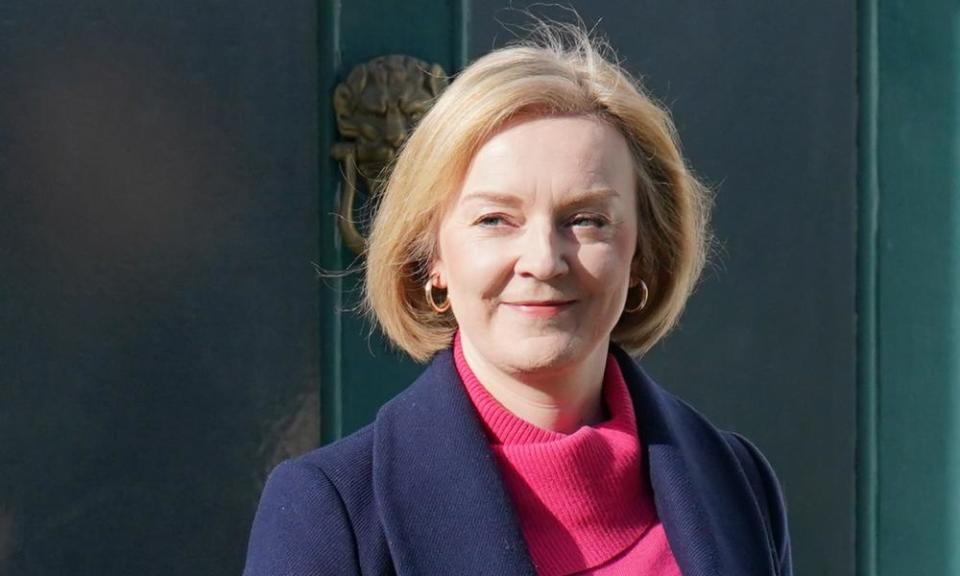Liz Truss admits cutting 45p tax rate was ‘perhaps a bridge too far’

Liz Truss has admitted cutting the 45p tax rate was a “perhaps a bridge too far” but said it was not fair to blame her mini-budget on rising mortgage rates.
The former prime minister said she did not regret her time in No 10, and that she hoped to stay in the political arena making the case for low taxes and growth within the Conservative party.
In an interview with the Spectator, Truss said she did not believe rising mortgage rates were the result of actions she took as prime minister. “I don’t think it’s fair to blame interest rises on what we did,” she said. “I think that’s unfair. On the UK factors, I believe there were other factors apart from the mini-budget.”
Related: The 'leftwing economic establishment' did not bring Liz Truss down. Reality did | Polly Toynbee
Truss said she had decided to make a series of interventions because she did not see anyone high profile in the party making the same arguments. The Sunday Telegraph published a 4,000 word essay she wrote justifying her choices as prime minister and she is expected to also speak at a conference in Japan on the UK’s role in standing up to China.
“I would be more than delighted to have other people go out there and make the case,” she told the Spectator. “But the fact is there aren’t enough people making the case, full stop. And I believe that I’ve learnt a lot in my time in government, I understand what some of the pitfalls are, I’ve been through the mill on this.
“I definitely want to be part of promoting a pro-growth agenda. I definitely want to carry on as an MP. I’m positive about the future of Britain and I’m positive about the future of the Conservative party. I think we need to start building more of a strong intellectual base. But I’m not desperate to get back into No 10, no.”
Truss said she had been right to cut taxes for the wealthiest as a way of signalling a new direction for the British economy, but that the Conservative party had failed to make the case historically, which meant she came up against too much opposition.
“I think economically it was absolutely the right thing to do … perhaps I underestimated the political impact it had,” she said.
“We could all think different things with hindsight, and perhaps it was a bridge too far, but I’m not convinced that it was a magic bullet, that everything would have been fine if we hadn’t done that, because I thought it was quite significant that after there were more market wobbles and we reversed the 45p tax decision relatively soon, we were essentially forced to reverse the position on corporation tax.
“Was I trying to fatten the pig on market day? Maybe. There’s a long history of failing to make the case, and that’s what I’m thinking now. I’m thinking: how can we make that argument?”
Truss suggested she might have survived the turmoil or made different decisions in office had she been warned about the vulnerability of UK pension funds and liability-driven investments. But she rejected the suggestion that the sacking of the Treasury permanent secretary, Sir Tom Scholar, was the reason she did not receive the fullest advice.
Related: Liz Truss seems keen to make comeback, but is anyone else on board?
“People said ‘why aren’t you communicating?’ But the fact is we didn’t know about the issue. We didn’t necessarily understand the issue, and that is a difficult position to be in as PM and chancellor,” she said.
“What we didn’t understand is the fragility caused by these liability-driven investments – and essentially what it meant was that small movements or rapid movements in the market could result in cash calls happening and essentially a chain reaction.
“I didn’t know the existence of LDIs, which turned out to be the main problem the following week … Our assumption was that we’d worked out these plans with Treasury officials. That, if there had been a major problem, it would have been flagged to us, yes.”
On whether Scholar’s sacking was part of the issue, she said: “I’m sure we’re not saying that there’s only one person at the Treasury who knows what’s going on. That doesn’t seem credible to me.”

 Yahoo News
Yahoo News 